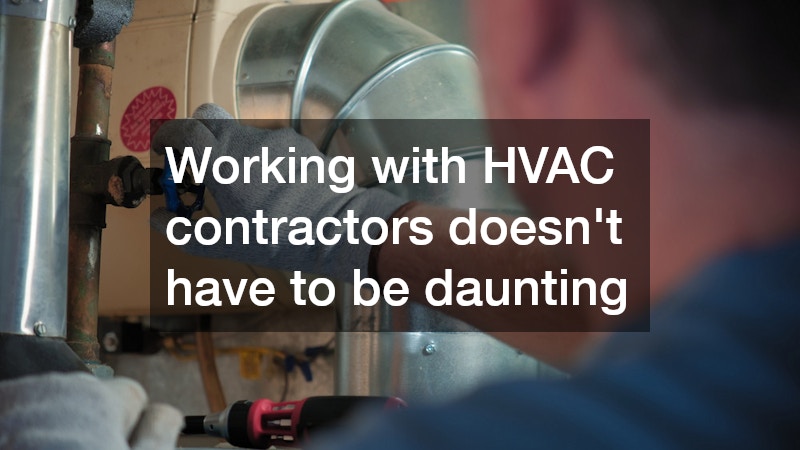In this comprehensive guide, we will explore essential aspects of working with HVAC contractors, helping homeowners make informed decisions. From choosing the right contractor to understanding cost factors, this article addresses the most common concerns. Whether you are installing a new system or maintaining an existing one, understanding the working dynamics with an HVAC contractor can greatly enhance your experience.
How to Choose the Right HVAC Contractor?
Research and References
The first step in selecting an HVAC contractor is conducting thorough research. Homeowners should start by reading reviews and asking for recommendations from friends or family who have previously worked with contractors. It is also crucial to seek references directly from potential contractors, as this can provide first-hand insight into their reliability and quality of work.
References offer objective perspectives on the contractor’s work ethic and professionalism. A reputable contractor will not hesitate to provide a list of previous clients who can vouch for their services. This extra step ensures that the contractor has a good track record and prioritizes customer satisfaction.
Besides references, checking online platforms like the Better Business Bureau can reveal if there have been complaints against the contractor. It’s important to consider both positive and negative feedback to get a balanced view. Doing your due diligence in this area can prevent headaches and ensure your HVAC project is completed to your satisfaction.
Licensing and Certification
Verifying a contractor’s licensing and certification is essential for ensuring safety and compliance. HVAC systems are complex, and errors during installation or maintenance can lead to significant issues, including safety hazards. Licensed contractors are required to adhere to industry standards, which is crucial for achieving optimal system performance and longevity.
Certification signifies that the contractor has passed the necessary exams and possesses an understanding of HVAC systems. The Environmental Protection Agency (EPA) requires specific certifications for handling refrigerants used in HVAC systems. Thus, choosing a certified contractor helps ensure that they are knowledgeable in handling various system components safely and effectively.
In addition to individual certifications, it’s wise to verify if the contracting company holds valid business licenses. A licensed business must follow local laws and regulations, which is reassuring for homeowners. While these verifications may seem tedious, they act as safeguards ensuring you hire a qualified professional.
Experience and Expertise
The experience and expertise of an HVAC contractor play crucial roles in determining the quality of service you will receive. Experienced contractors are often better equipped to handle unexpected issues and provide effective solutions. They typically have honed their skills through years of work and can offer insights that less experienced contractors might miss.
Specialized expertise is equally important, especially if you have unique system requirements. Whether it’s energy-efficient systems or the latest HVAC technologies, certain contractors specialize and even hold certifications in these areas. Hiring a contractor with the right expertise ensures that they can meet your specific needs efficiently.
Discuss with your potential contractor about their previous work on similar projects to gauge their level of expertise. Inquire about ongoing training or development courses they might have taken. A contractor committed to updating their skills is likely to deliver the most current and effective solutions.
What Are the Costs Involved?
Initial Estimates and Quotes
Obtaining initial estimates and quotes is a fundamental step in understanding the prospective costs of HVAC services. Most reputable contractors provide free estimates, allowing you to compare different options before making a decision. It’s advisable to obtain at least three quotes for the most accurate comparison.
During the estimation process, contractors should conduct a thorough assessment of your home to provide a detailed quote. Accurate quotes should include a breakdown of costs, such as labor, parts, and any additional services. Be wary of lowball estimates that may lead to hidden fees down the line.
Clear communication about your budget and scope of work is crucial when discussing estimates. Be sure to ask if the quoted price is firm or if it might vary based on unforeseen circumstances. A transparent contractor will clearly explain all potential charges in advance, preventing surprises when the bill arrives.
Factors Impacting Cost
Various factors can influence the cost of HVAC services. The complexity of the system is a primary factor; intricately designed systems often require more time and expertise, which can drive up costs. Urgent repairs may also be more costly due to the need for immediate attention and possibly expedited part ordering.
The size of your home and the type of system being serviced are additional considerations. Larger homes may have more extensive ductwork or require larger systems, increasing both material and labor expenses. Furthermore, high-efficiency systems, while costlier upfront, can lead to significant savings in energy costs over time, a crucial consideration for budget-conscious homeowners.
Financing and Payment Options
Various financing and payment options are available to help homeowners manage the costs of HVAC services. Many contractors offer flexible financing plans that spread the cost over a period, making payments more manageable. It’s important to fully understand the terms of any financing agreement, including any interest rates or fees that may apply.
In addition to financing, some contractors might accept credit card payments or offer discounts for cash payments. Discussing payment terms upfront can prevent misunderstandings and make the financial aspect of the project less daunting. Furthermore, it’s beneficial to explore any available rebates or incentives that could reduce overall costs, such as energy efficiency rebates.
Working with HVAC contractors doesn’t have to be daunting. By following these guidelines, homeowners can ensure they choose reputable professionals, understand cost implications, and know what to expect, resulting in efficient and effective HVAC services. Preparing adequately, engaging with contractors transparently, and remaining proactive in system care are key strategies for maximizing the value and functionality of your home’s HVAC system.





